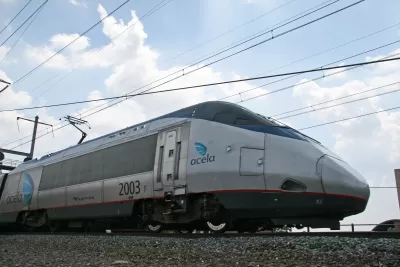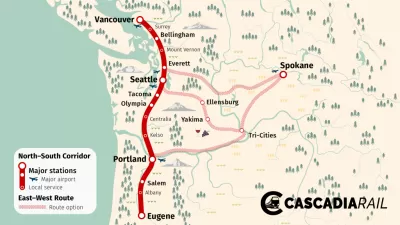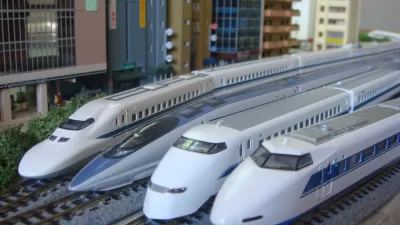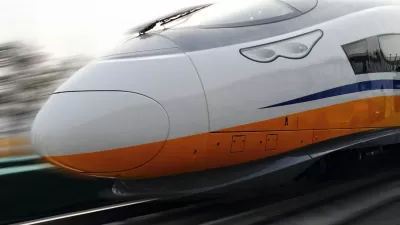Washington State released a report detailing the business case for connecting Seattle to Portland and Vancouver by high-speed rail.

The state of Washington released a report on economic impacts of a proposed high-speed rail (HSR) line connecting Vancouver, Seattle, and Portland. The report estimated that the line could bring 160,000 jobs to the Cascadia region and more than 350 billion new dollars in economic activity. "Drastically cutting travel time between the cities would also have the knock-on effect of drawing more companies to the region, which the report from the Washington State Department of Transportation argues would generate hundreds of billions of dollars in economic growth," Tyler Orton writes for Business in Vancouver. The new service could also curb emissions if it could tempt car and air commuters to use the train. The report estimates the project would eliminate 6 million tons of carbon emissions.
The planned train would travel at just under 200 miles per hour and be faster than any train service currently operating in the United States. Still, the Cascadia HSR is in the early planning phase. The proposed train does not currently have a route, and past attempts at HSR in the United States have failed to reach the speeds initially touted by boosters.
Even so, the report funded by the governments of British Colombia, Washington, Oregon, and the Microsoft Company does achieve a positive effect for the project. In 2017, the cost of the project was estimated to fall between $24 billion and 42 billion. The report says that estimate is still feasible.
FULL STORY: Vancouver-Seattle-Portland high-speed rail zips closer to reality with new business case

Planetizen Federal Action Tracker
A weekly monitor of how Trump’s orders and actions are impacting planners and planning in America.

Maui's Vacation Rental Debate Turns Ugly
Verbal attacks, misinformation campaigns and fistfights plague a high-stakes debate to convert thousands of vacation rentals into long-term housing.

Restaurant Patios Were a Pandemic Win — Why Were They so Hard to Keep?
Social distancing requirements and changes in travel patterns prompted cities to pilot new uses for street and sidewalk space. Then it got complicated.

In California Battle of Housing vs. Environment, Housing Just Won
A new state law significantly limits the power of CEQA, an environmental review law that served as a powerful tool for blocking new development.

Boulder Eliminates Parking Minimums Citywide
Officials estimate the cost of building a single underground parking space at up to $100,000.

Orange County, Florida Adopts Largest US “Sprawl Repair” Code
The ‘Orange Code’ seeks to rectify decades of sprawl-inducing, car-oriented development.
Urban Design for Planners 1: Software Tools
This six-course series explores essential urban design concepts using open source software and equips planners with the tools they need to participate fully in the urban design process.
Planning for Universal Design
Learn the tools for implementing Universal Design in planning regulations.
Heyer Gruel & Associates PA
JM Goldson LLC
Custer County Colorado
City of Camden Redevelopment Agency
City of Astoria
Transportation Research & Education Center (TREC) at Portland State University
Jefferson Parish Government
Camden Redevelopment Agency
City of Claremont





























